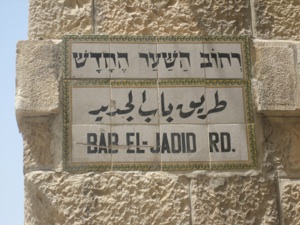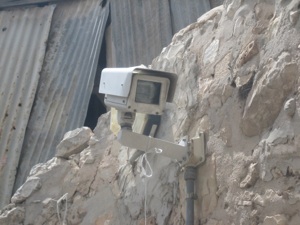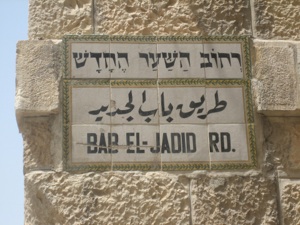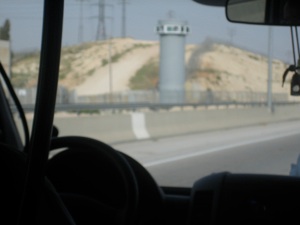Permits/ID

I had an interesting experience while travelling on a bus from Jerusalem to Bethlehem, filled otherwise with (I think exclusively male) Palestinian commuters. The bus was stopped and a (woman) soldier with rifle mounted it and checked everyone’s passes; this although virtually all the passengers were in any case about to go through the checkpoint at Bethlehem. All passes were taken to the rear of the bus, where I gather people’s numbers were recorded, before their being handed out around the bus again. People seemed resigned, not surprised. The man next to me commented: ‘They treat us like animals.’ Someone across the gangway called out to him in Arabic and I asked what had been said. The man had said ‘tell her what it’s like’ and my neighbour, with whom I’d had some conversation, had responded ‘she knows’.
If the women who run the Machsom Watch (Checkpoints) have difficulty in fathoming the permit system an outsider stands little chance! Palestinians are categorized according to where they reside, holding either an Israeli passport or an ID. A Palestinian living in Israel has an Israeli passport and cannot visit the West Bank. West Bank Palestinians commonly have Jordanian passports but an Israeli ID. Recognition that they are Palestinians is nil. There is a further distinction between Palestinians living on the West Bank and in occupied East Jerusalem. A residents’ permit for Jerusalem (much valued) is only valid for 3 months. It can easily be taken away at any time for a variety of reasons. This complex system means that families can be divided and movement becomes difficult if not impossible.
A West Bank person needing to visit Jerusalem (for example for a hospital appointment) requires a hospital pass. A Moslem wishing to visit Moslem holy sites in Jerusalem, to which they normally have no access, needs a praying pass, granted sometimes, to some (usually those over 40), for holy days. One Christian we met, who runs a Mediation Centre, had received an invitation to attend a meeting with the Pope on the latter’s visit to Jerusalem in 2009, but had not been able to get a permit. (In this day and age such a man makes good use of his e-mail to keep in communication with others.) A West Bank Palestinian married to a Jerusalemite may not live with their spouse in Jerusalem; if the spouse holding Jerusalem residents’ permit goes to live in the West Bank he or she will lose that permit.
In reverse, it is illegal for Israeli citizens to enter the West Bank area A (the major Palestinian settlements); if caught there they can be fined or arrested. It becomes almost insuperably difficult for people - who live in different worlds - to come into contact. Of course Israelis who have the courage to go to say, Bethlehem (an area ‘A’ town), or to Gaza, out of solidarity with Palestinians are given a royal welcome. Only an international can for the most part travel across boundaries as they will, though the Israeli authorities certainly do not like one visiting the West Bank (other than innocuously as a ‘pilgrim’ visiting holy sites).
From 1996 onwards IDs of people moving from Gaza to the West Bank have been ‘frozen’ (not updated); from 2000 all IDs. This has enabled Israel to classify all such people, including foreigners who have married West Bank residents, as ‘infiltrators’.
Further, it is not allowed that West Bank Palestinians travel abroad through Tel Aviv; they must exit through Jordan (the complications of the journey taking most of a day) and then fly from Amman. A Bedouin commented to us that it was easier to get to England than to Jerusalem! Foreigners are regularly refused entrance into Israel (and are thus also unable to visit the Palestinian territories).





Street sign, East Jerusalem. Israeli Jews have added the name in Hebrew, symbolically above, using the same tiles
Surveillance camera
Settler road with walls and watchtower. The walls are decorated for the benefit of settlers.
Gerard Horton, Defence for Children International
See Further on this Site:

